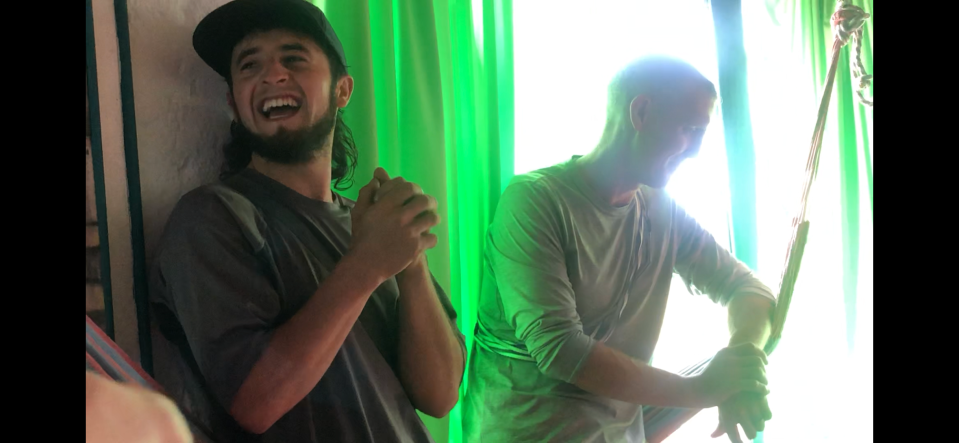An Update from the Frontlines
After my article “Battle of la Carolina” was posted, I was really excited and motivated by the response that we got from readers. I even shared the article with one of my male Ecuadorian soccer friends who I met while playing in la Carolina. In response, he wrote me a short text that made my heart swell to the point of exploding that said: “Alex, I would rather play soccer with you than any man.” And before you even think about raining on my parade, NO….it’s not like “that”. We are straight up talking about the enjoyability of playing soccer and companionship on the field here–nothing more.
That response, combined with now being chosen before my male counterparts whenever teams are being chosen had me walking pretty tall…until last week. Last week I came the closest I ever have to inciting physical violence. Here’s what happened….
Having recently returned from a 6 week visit to the States, I was eager to return to “la cancha” (the field). Despite being woefully unprepared for physical exertion at high altitude, I ventured to my battlefield (soccer fields in la Carolina park) last week to play with a group of university professors who play on Thursday nights. The guys were all excited to have me back, and I was feeling good about my warm welcome “home” and my companions’ excitement to have me back on the field.
About halfway through our first hour of play, this random guy wearing jeans and a red sweatshirt sauntered onto the field. He entered the field on the far end from me, and I could see him talking to a couple of my companions, or talking at them rather, and gesticulating in an argumentative manner. Play stopped and after a minute or so, I became impatient and walked toward the intruder. All the guys who play soccer with me call me “la princesa” –the princess– because they have all learned the very important lesson that I am the Boss. So since this guy was holding up my game, I started to cross the field to lay down the law and tell him to beat it.
When I got within hearing range, I stopped dead in my tracks. At first I thought that I was misunderstanding the words I heard–he couldn’t have been saying what I thought he was saying. I took a few more steps to listen better–heart hammering now. By the time I arrived alongside my companions who had been arguing with the man, the intruder had started to cross the field and walk away, but not before looking back at me, making eye contact, and spitting on the ground in my direction. That was when I knew my ears hadn’t betrayed me, that I hadn’t made an error in translation–he really had said what I thought I had heard.
He had come onto our field and stopped our game to say that I had to leave. He said that no women were allowed to play and demanded that I exit the field immediately. He remained on the field arguing with my friends, stating that he would not leave until I was off the field because it is “against the rules” that women play–that it is “prohibited”. He was adamant–hence why it took so long to get him to leave. When it finally hit me that I really was hearing him correctly, that it wasn’t a misunderstanding, he was already walking off the other side of the field. I tasted blood in my mouth and moved to go after him. It was a primal rage. I never understood why people fight–it always seemed so barbaric and immature to me, but in that moment, that was my instinct. Henry, my friend who had led the argument against the intruder, caught me as I moved toward the man and spoke calmly to me to let it go. I didn’t need to say anything–he knew what I was thinking, even if he couldn’t imagine the depth and heat of what I was feeling. My other friends had their eyes on me and almost seemed to be holding their breath, waiting to see what would happen.
Henry didn’t actually have to physically restrain me–it was more of an avuncular embrace meant to soothe; and I didn’t really try to pursue the man, it was just a flash of instinct. Within a second (or maybe 2), my logic and rationale kicked in, overpowering that initial primal surge of emotion. I remembered who I am, what my values are (violence not being one of them), and the wise words of my bestie, Michelle Obama, “When they go low, we go high.” I was better than the brawling men I so often rolled my eyes at who felt the need to physically prove their masculinity and physical dominance. No, that wasn’t, isn’t, me. I realized that my best defence and most powerful weapon was to keep playing–day after day after day; to continue to stake my claim on the field.
So the game restarted, I promptly scored 2 goals in quick succession, and I came back the next night to play again, and the night after that–daring anyone to try to tell me again that it’s not my place.
Just writing this got my hackles up again, anger pounding through my veins. So I have to remind myself to go back and reread the beginning of this post and remember that, slowly but surely, I am indeed winning both battles and respect in my ongoing war on machismo. La Princesa de la cancha triunfarà.





